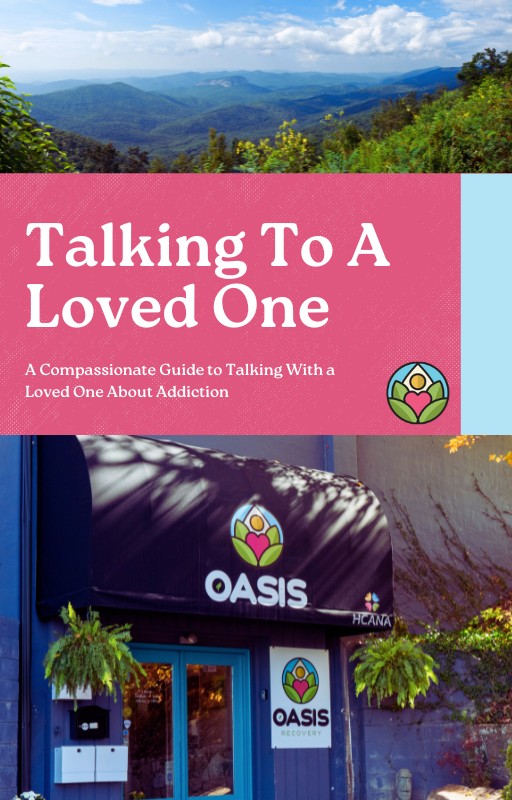A Compassionate Guide to Talking With a Loved One With Addiction
Why These Conversations Matter
Talking to a loved one with addiction is never easy. For many families, it’s one of the most emotional and delicate challenges they will ever face. You may find yourself wondering: What if I make things worse? What if they deny it? What if they push me away?
These worries are natural. Addiction is not only painful for the person struggling, but also deeply affects those who love them. Yet research and experience show that compassionate, supportive conversations can be the first spark of hope. Sometimes, simply letting your loved one know you see their pain, and that help is available, can plant the seed for change.
At Oasis Recovery Center in Asheville, we believe healing begins with human connection. This guide is designed to help you approach these difficult conversations with empathy, patience, and confidence. It will also show you how individualized treatment can help your loved one reconnect with their highest potential.
Understanding the Challenge of Addiction
Before you begin the conversation, it helps to understand what addiction truly is. Addiction is not a lack of willpower or a moral failing, it is a complex disease that impacts the brain, body, and spirit. It often develops alongside underlying issues such as trauma, anxiety, or depression.
Recognizing this reality allows you to shift from blame to compassion. Instead of viewing your loved one as someone who has made poor choices, you can begin to see them as someone who is suffering and in need of care. This mindset will shape the way you speak, listen, and support them.
Preparing Yourself Before the Conversation
Your own emotional state matters just as much as what you say. Before starting the conversation:
- Reflect on your intentions. Ask yourself: Do I want to help my loved one heal, or am I reacting out of frustration? Grounding yourself in love and care will keep the tone positive.
- Gather knowledge. Learn about addiction and available treatment options so you feel equipped to answer questions.
- Plan the timing. Avoid moments when your loved one may be under the influence or when emotions are already running high. A calm, private environment makes a difference.
Seek support. Consider talking to a therapist, counselor, or support group beforehand. Taking care of yourself strengthens your ability to care for someone else.

How to Talk to Your Loved One About Addiction
When the time feels right, use these strategies:
Speak With Empathy, Not Judgment
- Use “I” statements like “I feel worried when…” rather than “You always…” statements.
- Avoid accusations, which often lead to defensiveness.
Share Specific Concerns
- Instead of general comments, mention concrete examples of how their behavior has affected you. This shows you’re paying attention and truly care.
Listen More Than You Speak
- Give them space to respond. Even if they react with anger or denial, your willingness to listen shows respect and care.
Offer Hope, Not Ultimatums
- Present treatment as an opportunity for growth, not a punishment.
- Reinforce that recovery is possible and that they don’t have to do it alone.
Common Reactions and How to Respond
It’s important to set realistic expectations. Your loved one may not immediately welcome your concern. Here are a few common reactions and gentle ways to respond:
- Denial: “I don’t have a problem.”
→ Respond: “I hear you, but I’ve noticed things that make me worried. I care about you too much not to share that.” - Anger: “Why are you attacking me?”
→ Respond: “I’m not here to attack you. I’m here because I love you and want to see you healthy and happy.” - Avoidance: “Let’s not talk about this.”
→ Respond: “I understand this is hard. I’ll be here when you’re ready, because your wellbeing matters to me.”
Remember: sometimes planting the seed is enough. Change may take time, but your compassion can make a lasting impact.
Connect With Us Now
Reach out to us now for immediate support, or let us know the best time to contact you through our confidential callback service. Your journey to healing is just a conversation away.
The Role of Professional Treatment
Even the most loving families cannot overcome addiction alone. Professional treatment provides the structure, tools, and support necessary for long-term recovery. At Oasis Recovery Center, we understand that each person’s story is unique, which is why we create individualized treatment plans that address the whole person, not just the symptoms.
Our addiction programs include:
- Evidence-based therapies such as individual counseling, group therapy, and trauma-informed care.
- Holistic healing practices like mindfulness, yoga, meditation, and creative expression.
- Skill-building to help clients rebuild confidence, communication, and resilience.
- A supportive community where individuals feel seen, heard, and empowered to grow.
Recovery at Oasis is centered on rediscovering purpose and connecting with a higher potential for life.

Supporting Your Loved One Beyond the First Conversation
Recovery is a journey, and your role in it is important. Here are ways you can continue offering support:
- Stay engaged. Continue to check in, even if progress feels slow.
- Encourage professional help. Share resources and be ready to walk with them through the process.
- Respect their pace. Change takes time. Do you very best to avoid forcing or pressuring.
- Practice self-care. Attend support groups, find counseling for yourself, and create healthy boundaries.
Caring for Yourself While You Care for Others
It’s common for families to neglect their own needs while focusing on a loved one’s recovery. But your wellbeing matters. Remember:
- You can’t pour from an empty cup.
- Seeking support for yourself doesn’t mean you’ve failed, it means you’re building strength.
- Oasis Recovery Center also provides resources for families, helping you heal alongside your loved one.

Connect With Us Now
Reach out to us now for immediate support, or let us know the best time to contact you through our confidential callback service. Your journey to healing is just a conversation away.
A Path Toward Healing
Having a conversation about addiction may feel overwhelming, but it could also be the turning point your loved one needs. By approaching them with compassion, patience, and hope, you’re creating an opening for healing.
At Oasis Recovery Center in Asheville, North Carolina, we believe recovery is always possible. Our team of caring professionals is committed to walking alongside individuals and families as they rediscover their resilience, joy, and highest potential.
If you’re ready to take the next step, we’re here for you.









